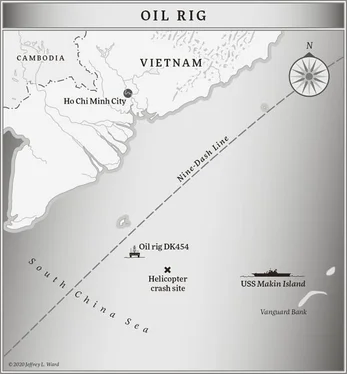Someone at HQ needed to know about this—if only so Rask could cover his own ass from the blowback. He fired off the cable, making his boss aware of the situation, and then leaned back and sent a copy to his buddy on the Central Asia desk. If someone was poking around looking for Uyghur separatists, he’d want to know.
28
An hour into the seven-hour flight on the C-21A, the U.S. military’s version of the Bombardier Learjet 35, Dr. Patti Moon decided this kind of luxury was something she could become used to. They made a short stop to refuel at an FBO in Calgary, Alberta, and then continued direct from there to Washington Reagan. She had the plane to herself—just her and a couple of hotshot pilots who liked to practice near-vertical takeoffs and then explain how the Lear was really a fighter jet in a suit and tie. And anyway, somebody up the chain wanted her in D.C. ASAP, the pilots said, so they were told by their bosses not to spare the horses.
The closer they got to D.C., the more fretful she became. The whole suit-and-tie thing didn’t help. Moon’s mother, an extremely devout and weekly attendee of the Tikigaq Bible Baptist Church in Point Hope, had drummed into her from an early age that the devil would not be dressed in rags when he came to tempt her. He would, in fact, be dressed in fine furs … or even a suit and tie.
She’d worked herself into a lather by the time the little jet lined up left of the Potomac River and settled into a grease-smooth landing at Washington Reagan.
To make matters worse, the tall man in Navy khakis who met her in the lobby of Signature Flight Support at the south end of the airport introduced himself as Commander Robbie Forestall, a national security adviser to the President of the United States.
Navy habits abided long, and she very nearly introduced herself as Petty Officer First Class Moon. She caught herself, shook the commander’s hand, and then stepped back and let him lead the way. A meeting with the national security adviser … That was going to be weird. Still, Moon supposed she’d asked for it by asking Barker to push the recording up the chain.
The Marine helicopter had picked her up at breakfast, and the entire trip had been relatively short, but the time difference between Alaska and the East Coast meant it was already well into the evening by the time Commander Forestall showed Moon to a black Lincoln Town Car. He gave her a bottle of water and offered to help her with her bag, but she refused and held it on her lap instead.
Traffic on George Washington Memorial was a steady flow of red lights and headlights—a shock to Moon’s system after the high lonesome solitude of the far north where she spent much of her life. The ice floe was dispassionate and could crack loud as a gunshot, but there was silence there, too, and, when the sky was clear, the bowl of stars and aurora brought peace to Moon’s ever-wary soul.
D.C. had the opposite effect. On steroids. Being plunked down here in the middle of a rat race made her chest tight to the point she thought she might be having a heart attack. By the time Forestall took the 14th Street Bridge across the Potomac into D.C. proper, Moon resolved that she would attend her little meetings, answer some bureaucrat’s questions, and then haul her ass out of here as fast as she could.
Then Independence Avenue and the National Mall appeared in the windshield and she began to wonder where they were going. Her theory had gone up through Navy channels, so she’d figured they’d put her up somewhere in Crystal City. There were some damned fine hotels there that gave the government rate and were always crawling with service members from all branches that had business at the Pentagon. Must all be full, she thought.
“What hotel am I at?”
“I’m not a hundred percent sure,” the commander said, easy and honest, like they were old friends. “I’m thinking they have you at the Willard. It’s just a block away, but I’ll drive you over. It’s no problem at all.”
Moon had read somewhere about the Willard, but couldn’t place it.
“A block away from what?”
“The White House,” Forestall said. “That’s where your meeting’s at.”
Moon leaned forward, craning her neck over the front seat. “Wait, wait, wait. Commander, are you telling me that the national security adviser wants to meet with me at the White House about the noises I recorded under the ice?”
Forestall gave her a wry smile. “Not exactly.”
“Whew,” Moon said. “Because that would have given me a stroke.”
The commander laughed out loud. “I am so sorry,” he said. “Your meeting isn’t with the national security adviser. I thought you already knew …”
Jack Ryan had just walked into the Oval from the colonnade, still wearing his black Orioles baseball jacket against the evening chill, when Commander Forestall entered from the secretaries’ suite. Arnie van Damm, Mary Pat Foley, SecDef Bob Burgess, and Admiral Talbot, chief of naval operations, were already present.
Dr. Moon was not.
Ryan raised his hands, palms up, shooting a glance at Forestall. “Did she escape?”
“I apologize, Mr. President,” the commander said. “I have her signed in and set up with a visitor’s badge, but she insisted on calling her father before coming in. She’s standing outside the entrance by the press briefing room to make the call. Millie from Secret Service Uniform Division has an eye on her, but giving her space.”
Ryan sat down beside his desk.
He’d already been to the Residence and grabbed a quick dinner with Cathy—crab salad with quinoa that was tasty enough but left him craving crab cakes from Chick & Ruth’s in Annapolis. He’d changed out of his suit, thinking that since Dr. Moon was coming straight off a plane, she’d be more relaxed if he were dressed in jeans and an open-collared shirt.
“I’m really sorry, sir,” Forestall said. “She was very insistent.”
“It’s not your fault, Robbie.” Ryan waved off the apology, resting his elbows on the desk, looking glum as a schoolboy benched during a ballgame. “At our level, you get used to people waiting on you instead of the other way around.”
Forestall chuckled. “Our level, Mr. President?”
“You know what I mean,” Ryan said. “In charge of things.”
Van Damm crossed to the door. “I’ll go get her.”
“Give her a second,” Ryan said. “Everyone processes these meetings differently. What we have here before us, as my dad used to say, is the opportunity not to be assholes. He held leaders to a high standard, my old man. You were either a good leader or a bad one. Good leaders could make mistakes, but the higher up the chain they were, the better my dad expected them to treat their subordinates.” Ryan’s eyes glistened. “Remember that anecdote about the Army private who was late for formation and he ran around the corner and knocked General Eisenhower to the ground. There they were, the bottom rung of the enlisted ladder, and the five-star supreme commander of Allied Forces. Remember what General Eisenhower said to the kid?”
No one answered.
“‘You better be glad I’m not a lieutenant,’” Ryan said. “I don’t even know if it’s true, but it’s a damned good story.”
Dr. Moon arrived two minutes later, giving a decidedly jaundiced eye to everyone in the room. Ryan took her hand and smiled. “I’m not going to beat around the bush,” he said, “except to say that we’re reading you in to some extremely sensitive subjects that shouldn’t be discussed with anyone outside this room unless you clear it with Commander Forestall.”
“Understood, Mr. President,” Moon said, her face a granite wall, impossible to read.
“All right, then.” Ryan took a seat in his customary chair by the fireplace and offered Moon the chair beside him while everyone else took the couches. “A lot of big, giant brains seem to be divided about whether your recordings depict something made by man or fish noises. Certain events have transpired that give weight to the ‘man-made’ argument, but you’re the closest person we have to the source. I’d like you to make your case.”
Читать дальше











![Александр Ирвин - Tom Clancy’s The Division 2. Фальшивый рассвет [litres]](/books/417744/aleksandr-irvin-tom-clancy-s-the-division-2-falsh-thumb.webp)
